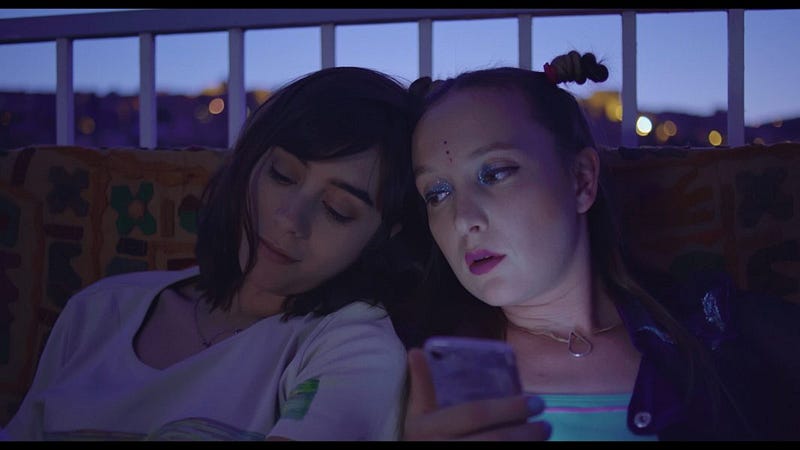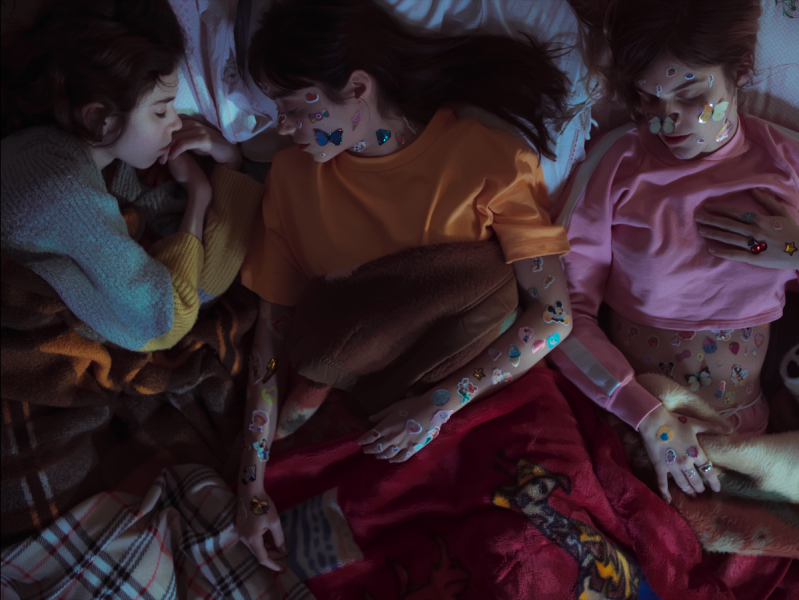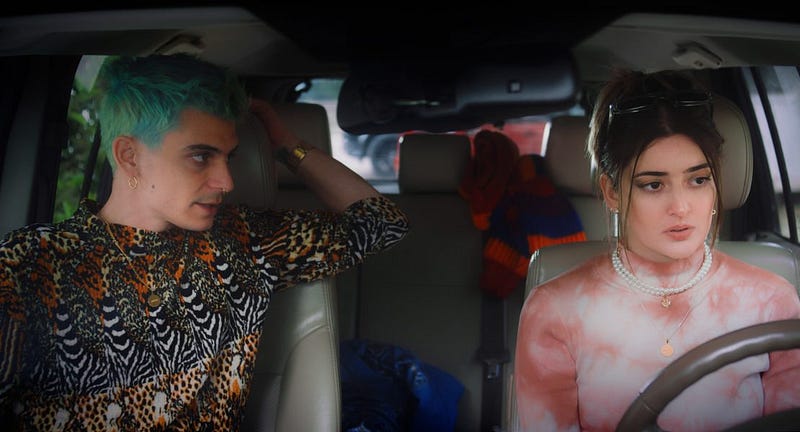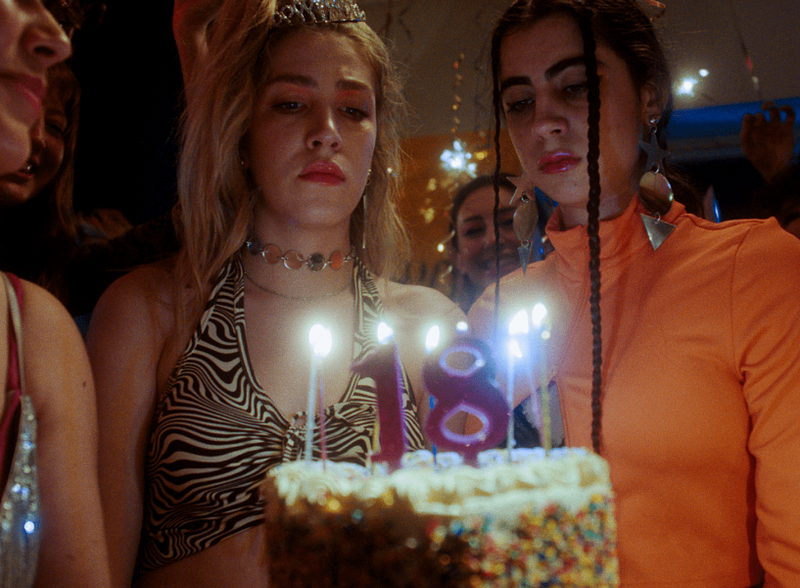19.10.2023
The uninhibited and unapologetically pop cinema of the directorial duo Lida Vartziotis and Dimitris Tsakaleas
Κινουμενη εικονα
Γλώσσα πρωτότυπου κειμένου: Αγγλικά
Lida Vartzioti and Dimitris Tsakaleas, SNF ARTWORKS Fellows in 2022 and 2021 respectively, are among the very few directorial duos in Greek cinema, both in number and as concerns the genre of the cinema they serve. Yawth, their first short film and the biggest surprise of the 41st International Drama Short Film Festival in 2018, introduced us to two filmmakers still studying at the School of Film of the Aristotle University of Thessaloniki, who spoke with a fresh eye and a pop aesthetic about something as simple and as complex, as timeless and as topical as the problems and anxieties of their generation. The follow-up was equally impressive, as their short films travelled to prominent international festivals such Karlovy Vary, Sarajevo, Palm Springs and Cairo but above all proved that, with each new film, the two directors are growing more mature yet while remaining true to their artistic vision and to the films they have been attached to since their teenage years. As their next short film is about to go into production and the duo is in the financing stage for the first feature, Lida Vartzioti and Dimitris Tsakaleas talked to us about what makes their cinema as special and as appealing to their generation but also to others.

The first contact with the moving image
Lida Vartziotis (LV): One of the things I remember most distinctly is my tendency to escape into fantasy. When I was little, I always wanted to write stories. Growing up with the films of Disney and Pixar, I realized I too could give flesh to the images I had in my head. I started looking into what it meant to be a director. I didn’t know there was a directing school in Greece, it was only recently that the Aristotle University of Thessaloniki had opened a film school admitting students through the general entry exams for Greek universities. So I tried to get in, hoping to satisfy my need to understand more about the world and to play with the world of my imagination.
Dimitris Tsakaleas (DT): My story is quite similar. From a very young age, I started thinking in images. I used to watch a lot of movies. I was, and still am, a big fan of Friends and I would watch the behind the scenes to see how the show was filmed. And as I was already thinking through images, I slowly discovered how you can create them. Lida and I met at the School of Film in Thessaloniki. We have a very similar background, so we clicked right from the start. We were watching very different films, Lida was into Kusturitsa and me into High School Musical, but we bonded immediately. At first, we were just doing film-essays in different university contexts, but on our third year we decided to do Yawth. I had already started writing the script for it — back then, Leda was writing the script for Good Girls Club: A Virginity Odyssey, our latest film. Our plan was to do just Yawth together and then I would help Leda direct Good Girls Club: A Virginity Odyssey by herself. But we kept postponing the project, until, at one point, we realized we didn’t want to make a movie separately. As we didn’t have the budget for Good Girls Club at the time, we did Sad Girl Weekend instead.

Realizing that there is a shared artistic vision
LV: What brought us together was the fact that we wanted to make the same films, despite having different references. Through our discussions, we realized that we shared similar experiences and were concerned about the same things. We wanted to talk about the same things. This is what united us.
DT: I think it’s a matter of having the same energy. With Lida, I feel like we are husband and wife and siblings at the same time. There was a very strong click from the beginning, we felt like we’ve known each other since we were kids. As students, without planning to, it just so happened that we lived across the street. We were talking to each other constantly, from morning to evening, day in and day out. Making films together was a natural development, it is this energy that comes out in our films.
Handling disagreements
LV: Being two means that we need to verbalize what we feel and think, and of course justify our choices. Dimitris and I discuss every idea we have and if one of us expresses a reservation, then we just move on. We don’t get into arguments, and none of us insists on getting their way. We never do that.
DT: Lida and I have never fought over artistic decisions.
The possibility of a solo project
LV and DT: Doing things separately doesn’t work for us. We have many director friends who take it as a given that they will be directing their own projects. We never saw things this way. Working together comes naturally to us, we don’t feel the need for a solo project.

The need for public higher education in the field of cinema
LV: The School of Film is housed in a public university, so it has the usual problems of all public universities in Greece. However, it offers a five-year film education, which includes courses that will prove very useful in the long run. Especially if your aim is to become a director, you learn a lot about other areas of film and about what it’s like to work with professionals from other fields. Also very important is the fact that you are taught art and film history, as well as film theory.
DT: It’s very important to have a university department like this in Greece. As professionals, we always feel that art and culture are marginalized in this country. It is expedient for a public university somewhere in Greece to offer cinema studies. Our teachers are excellent professionals and we have the chance to develop networks and collaborations with our fellow students. These things happen in private schools too, but there are students who can’t afford to go to those. Also, ours is one of the very few art schools across the world that offer a 5-year course of study. You learn a lot of things in depth and when you finish you feel ready to start working in film.

Yawth or how it all started
LV: Dimitris had the idea for Yawth. He wrote the script during the summer before our third year. And when we came back to Thessaloniki, I read it and we decided to do it together, to write and direct it together.
DT: Yawth was a very sweet depiction of how we and the people we knew experienced Thessaloniki at the time. I saw it again recently. The film treats its characters with a lot of love, and I like that because I feel that we loved ourselves back then. All our films draw from our own experience. This film captures what was a typical student night for us in Thessaloniki, with social media very present in our lives. We already had Iro Aidoni and Maria Laskaridou working on the production, but the team gradually grew stronger with the addition of our fellow students and some people we knew. From the very beginning, Lida and I wanted to make cinema for the general public, like the films we grew up with but from a new directorial perspective. We were naïve, like every new filmmaker, and our enthusiasm paid off.
Festival acclaim
DT: I still remember the moment I opened my email and read that we were accepted to the Drama International Short Film Festival. There was no student section at the time, so it was rare for student films to get accepted. We didn’t expect it. It felt like going to Cannes. Yawth was a big hit in Drama. From the beginning, we believed in the film and thought it would put us on the map, which it actually did. There were no Greek films of this genre at that time. And it feels like they were really needed.
The appeal of a pop cinema addressed to younger generations
LV: The main thing for us is for our films to be grounded on experience. To tell our own stories. We want to grow together with our characters. The concerns we had in our twenties are different from the ones we have now. We don’t define or label what we do, and don’t care to use descriptions of the type “a pop cinema for our generation”.
DT: Without realizing, our characters help us evolve. They are our way of processing what we experience, a kind of therapy. We’re glad that this has started a trend and are fully aware of the marketing part of the business. We’re glad that directorial duos are now gathering attention. After the Daniels and the success of Everything Everywhere All At Once, there is a lot of interest and a lot of space for directors working together.
The stakes of the first feature film
LV and DT: Our first feature film is a splatter horror film. Friends Birthday’s Murder Etc and it’s a coming-of-age film — basically a slasher in the woods. It’s still in the early stages, we just got funding from the Greek Film Center. We’re also working on another short film, scheduled to come out in October. We can’t announce the title yet, but we can say it’s a summer film and that it’s the first one we’re doing with such a big cast. It will be a summer fling. Once the film comes out, those who have seen our previous work will surely recognize many elements but in a different context, more grown up.

The challenge of finding the right cast
LV: For our early films, we casted mostly non-professional actors that we liked, who we though fitted the image we had in our heads, but also established professionals who trusted us in our first steps, such as Georgina Liosi, Romanna Lobach, Elsa Lekakou and Natasa Exidaveloni (heart to all of them). In our more recent work, we often do casting calls but it’s a process that’s uncomfortable for everyone. We get very anxious trying to do things right, since people take time out of their lives to send you photos and their personal details, so it’s a process that needs to be done carefully and with a lot of respect for others. Because we work with images, we try to find actors who fit that image.
Cinema as a path to self-improvement
DT: After Yawth’s screening in Drama, its success and the Greek Film Center’s contribution made things easier for us for Sad Girl Weekend, which was already in pre-production. We were aware of its success, but we weren’t really affected by it. Our main concern is to improve and learn something new with every film we make. We want our next work to be always better than the previous one. Our goal is to make a living as filmmakers. We are always nervous to see how well our film will do, if it will travel to international festivals. Our nervousness was even more pronounced in the third film, Literal Legend, which came after the international success of Sad Girl Weekend. We’ve learned to live with that stress and we’re slowly shedding it. Eventually, every film finds its home.
The elitism of arthouse cinema
LV: The type of cinema we make appeals to the general public. Outside Greece, in particular, people don’t expect this from Greek filmmakers. In Greek and international festivals, this type of crowd-pleasers are considered somewhat inferior in quality, which is sad and unfair. However, crowd-pleasing films also express something of our culture in a tangible manner.
DT: When Lida and I turn forty, I don’t think the main characters of our films will be in their twenties. We’ll be talking about people in their forties, and how they experience life in their forties. We’ve tried to include characters who are older than us, but we’ve decided against that for the moment.
Τhe greatest recognition of all
LV: It fills us with joy when we find ourselves surrounded by people who don’t know us personally and get asked if we have heard of Sad Girl Weekend. We find it very rewarding that people of our generation are familiar with our films. We are, of course, happy when critics express a positive opinion about our films but the most important thing for us is to feel good about our work once filming is over.
The challenges of making cinema in Greece
DT: We live in a country where the process of making and financing films forces directors to treat their work as a hobby. This is the most acute problem. So I understand the anger. I too am angry. Some of us don’t want to work in advertising to make a living, and that’s perfectly respectable. Also, as very few projects get funded, there are many filmmakers who spend years making short films without getting the chance to do a feature. Funding resources are limited and once established mechanisms fail to work there’s a domino effect that prevents you from moving forward.
The prospects of working outside Greece
LV: We considered moving abroad before the pandemic. We considered giving it a shot. We would have loved to work in other countries as directors, but since relocating to Athens, we found a new appreciation for what there is here. As we were already going somewhere with our films here, we didn’t want to lose everything we had built. However, we would like the idea of filming abroad while being based in Athens.
Future Goals
LV: What we want more than anything is to make films. We want our films to be screened in many theatres and we want these theatres to be packed. We don’t care much about what people will say about our work, or about whether it will define or redefine something. We grew up with what people call mainstream cinema, so we want to make films that teenagers and young people can identify with, that speak to them in their own language.
Streaming vs. movie theatre
DV: Streaming is the organic evolution of the movie theatre. Cinema runs no risk of dying from it. Our generation would have trouble believing that. Streaming is one thing, the movie theater another. There are people who don’t have access to cinemas, older people or people in rural areas where not all films are shown. It’s a bit elitist to say that you only see films in the cinema or that you want your films to be shown only in cinemas. We grew up in the countryside. People often complain that a film is shown in only one cinema in Athens, but outside Athens they are not shown at all. If it weren’t for streaming, some films would never reach viewers. We see the point, but we can’t really understand why everyone is getting so upset over this. Culture can fit into many different contexts.
Dimitris Tsakaleas and Lida Vartzioti are a directing duo working on film, commercials and TV. Their films have travelled to film festivals around the world (Karlovy Vary IFF, Palm Springs Shortfest, Cairo IFF, Sarajevo IFF, Norwegian Short IFF, Trieste IFF, Braunschweig lFF, etc) and were screened at Directors Notes, CINOBO. They have been awarded the Stavros Niarchos Foundation Artist Fellowship by ARTWORKS and are alumni from Sarajevo & Berlinale Talents.
Tassos Chatzieffraimidis is a lawyer and a freelance writer based in Athens. He currently works as a film curator at Cinobo, a digital platform dedicated to independent and arthouse cinema.



